As many of you know, the Gifting Sense project has long championed teaching kids the powerful habit of thinking before buying. So try to imagine our sheer delight when a series of brief TED Talks entitled “Your Money And Your Mind,” narrated by and based upon the work of behavioral scientist Dr. Wendy De La Rosa, was brought to our attention. (You can watch all of them in about 30 minutes.)
Dr. De La Rosa doesn’t believe we can teach financial insecurity away. Her research concludes that people need to be able to change their environments to consistently make decisions that support what they already know about money: that you can’t spend more than you earn. Changing a child’s spending environment is exactly what we do when we ask them to calculate the DIMS SCORE® for a possible purchase before it is made.
Calculating the DIMS SCORE® is a spending “speed bump.” It helps young consumers drive their personal finance vehicles safely—by slowing down the speed at which consumer decisions are made. The DIMS SCORE® Calculator helps kids experience just how easy and powerful planned spending can be; it allows them to experience first-hand that it only takes minutes to ask and answer simple questions about typical purchases before you spend your money or anyone else’s. But those minutes can help students (and their families) avoid disappointment and reduce waste for days, weeks, months, and sometimes even years!
One of Dr. De La Rosa’s helpful suggestions for people who want to reduce their takeaway meal spending is establishing a “frequency budget.” Counting the number of times you eat out each week is much easier than managing the dollar amount spent on each meal. It’s much easier to remember that you only have one or two meals left in your takeaway allowance for the week rather than $37.00.
The series finale discusses the benefit of using a vacation day to manage personal finance tasks (like paying off debt with each paycheck instead of monthly or redesigning your online environment to avoid being constantly invited to spend). Dr. De La Rosa compares this “financial health day” to a day at a spa because you can feel good at the end of it. She even encourages employers to provide time in the benefits calendar for such a day.
So consider having the money conversations we all need to have with our spouses, friends, and children, according to Dr. De La Rosa, our new favorite lifestyle physician. Those talks can go a long way in terms of normalizing that money is scarce for many and finite for all. We don’t know how Dr. De La Rosa will feel about our description of her as a “lifestyle physician,” but it is certainly meant to be a compliment. The relationship between personal financial health and an individual’s overall well-being is understood now more than ever. Anyone who helps others reduce financial stress operates within some branch of the wellness world.
On International Women’s Day, we salute Dr. De La Rosa and the reader who texted us the link to her work! They immediately understood the connection between Dr. De La Rosa’s research, our workshops, and a bold but achievable dream: that one day soon, young adults everywhere will thank their parents for teaching them about money rather than vocally wishing out loud on various social media platforms that those lessons had taken place. To learn how, click on the pink or blue buttons below.
Child Development DIMS SCORE® Questions Financial Literacy For Parents For Teachers Inspiring Financial Writers



